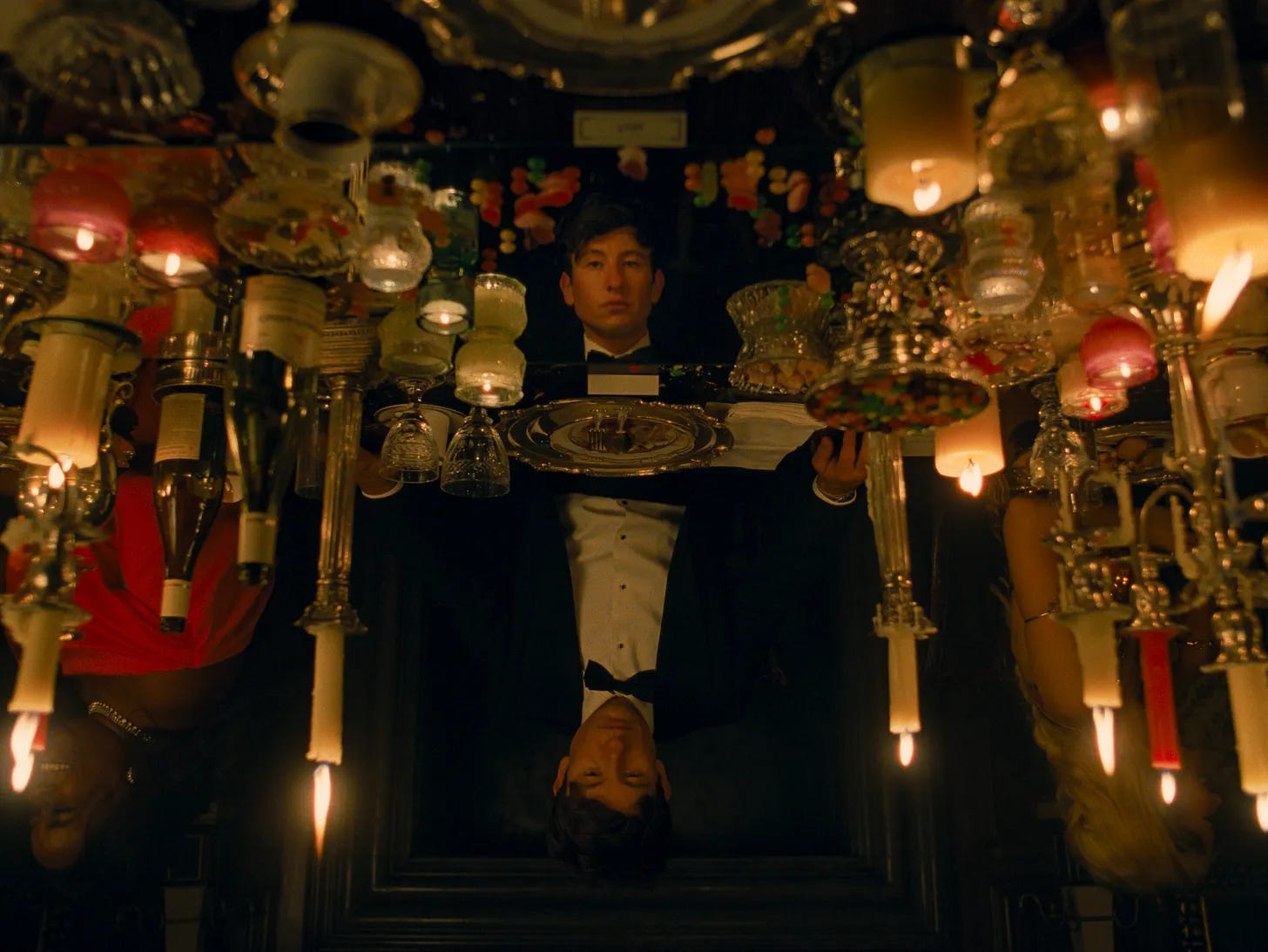Hating Emerald: ‘Saltburn’ and why its loudest detractors are wrong
The sophomore feature by writer-director Emerald Fennell was always going to be divisive. But a main critique that’s emerged of ‘Saltburn’ is clearly wrong
Ever since I saw Emerald Fennell’s Saltburn, when it closed out the Philadelphia Film Festival in late October, I knew it wasn’t going to be for everyone.
I loved the film, and it will appear on my top ten list for 2023 next month. I thought it was beautifully photographed, featured a half dozen fine performances, and had an admirable audaciousness. It drew on everything from Brideshead Revisited to The Talented Mr. Ripley to Parasite, and it contained plenty of surprises. (The film is in theaters now; read my review here.)
At the same time, I can certainly understand why someone would dislike Saltburn. The film contains multiple scenes of shocking sexual provocation that are going to turn some viewers off. While there are plenty of surprises, plenty of viewers clocked the big plot twist from the beginning, I’m told.
People are arguing about the movie, and that’s a good thing because movies should start arguments. I completely get why someone would give Saltburn a negative review.
But there's another narrative that’s emerged about Saltburn that’s much less defensible: That the film is a jeremiad, on Fennell’s behalf, in defense of the English upper class, as a warning against letting lower- and middle-class people into their lives. And this is often accompanied by treating Fennell as a detestable villain, certainly the primary Big Bad of this year’s awards season.
That interpretation of the movie is just self-evidently wrong- it’s seeing something in the movie that isn’t there. And the shots at Fennell seem to be disproportionate, even if you’re not a fan of her work.
Versions of this argument have been made by multiple film critics whom I respect very much. Jeff Zhang wrote “Leave it to Emerald Fennell to turn satire of moneyed aristocrats into an actual indictment of the working class.” Walter Chaw called the film “an example of how the rich see themselves: as victims, mainly, of opportunistic predators from the lower classes who would seek to insinuate themselves into their good graces.” Novelist Sonia Pernell called it “a movie warning rich people to exclude poorer people because otherwise they’ll rob you and kill you.”
I don’t believe that’s what this movie is. Describing why requires going a bit into SPOILER TERRITORY for a couple of paragraphs.
Barry Keoghan plays Oliver Quick, a scholarship student at Oxford who is befriended by Felix Catton (Jacob Elordi), an extremely rich fellow student. Claiming to be the son of dirt-poor alcoholics, and that his father recently died, Oliver is invited to the titular home of Felix’s family, an impossibly massive country estate.
It is at this estate where most of the film’s action takes place, including various combinations of sexual debauchery, as well as quite a few deaths. We also learn that Oliver isn’t quite as poor or beleaguered as he originally claimed. The film ends with Oliver revealed as a sociopathic criminal mastermind, out to murder the Catton family and take control of the family and the estate.
(SPOILERS END.)
The argument made by various critics is that Fennell identifies closely with the wealthy Catton family, sees them as the film’s point of view characters and that she sees Oliver as a usurper of her own way of life.
I see little of that in the film itself. The world of wealth is presented by Fennell as ridiculous, with the parents (played by Richard E. Grant and Rosamund Pike) depicted as privileged weirdos with a million strange rules and all sorts of odd traditions and peccadillos. Their kids (Elordi and his sister, played by Alison Oliver) are shown as dim bulbs, albeit almost cartoonishly beautiful ones.
Is there wealth porn here? Absolutely. The film, like so many pieces of media in recent years that run from Parasite to the Real Housewives franchise, asks us to analyze the strange and sometimes awful behavior of the super-rich, while also noticing that their houses and clothes are expensive and beautiful.
Fennell may know this world, at least peripherally, but she’s not necessarily extolling it or defending it. It is, in the end, yet another depiction/endorsement misunderstanding.
As for the vitriol directed at the director itself, it just feels like all the Sofia Coppola arguments of the last 20-plus years — and also the Lena Dunham arguments — all over again.
Fennell’s father is a jewelry designer known as the “King of Bling,” while her mother is an author. She went to private schools and Oxford, although she doesn’t appear to have come from peerage or aristocracy or the other U.K.-specific forms of generational wealth, and it’s not clear if she was ever in the same social strata as the characters in the movie (although now that she’s a successful actress and filmmaker, she’s likely gotten closer to it.) Did Emerald Fennell grow up on a palatial country estate that makes Downton Abbey look tiny? I have not seen that demonstrated.
That certainly contributes to the anger directed at Fennell, as do a couple of other things. She achieved a great deal of success relatively quickly, winning a Best Original Screenplay Oscar for her second-ever film, Promising Young Woman, which is the sort of thing that breeds resentment.
Also, a lot of people really hate Promising Young Woman, and also the second season of Killing Eve, over which Fennell presided. She also occasionally says things in interviews that make people’s heads explode, such as her recent suggestion of an “erotic” version of Jurassic Park.
For the most part, these criticisms are deeply unfair. Fennell’s parents may be wealthy, but they’re not in the film industry, and while being raised in wealth certainly helped her succeed in life, there’s no indication that her parents handed her a career as an actress, writer, and director. And much like with Sofia Coppola, they say you’re supposed to write what you know, and Fennell has done that. If she’d instead dedicated her career to making movies about the plight of the poor, that would trigger a whole different set of mean criticisms.
As for Promising Young Woman, I remember liking it quite a lot, at the time, although like every other movie of 2020, I saw it in a mid-pandemic pseudo-fugue state and my judgment at the time may not have been at its best. I didn’t particularly like Fennell’s Killing Eve season either, but I’m not sure that show’s premise was so sustainable anyway- and I’ve also enjoyed Fennell’s acting, including when she played Camilla Parker-Bowles in the middle seasons of The Crown.
I doubt that her “erotic Jurassic Park” idea could ever happen, but if it did, it would almost certainly be the best Jurassic Park movie since the original.
If the worst thing Emerald Fennell has done is say the wrong thing in a couple of interviews, make movies and TV shows that you disliked and enjoy success at too young an age… those are relatively minor crimes, by Hollywood standards. I have terrible news for you about what other people in the movie industry have done.
It would seem, in fact, that the anti-Fennell backlash is similar to the previous backlashes against Anne Hathaway, Brie Larson, Jennifer Lawrence, Rachel Zegler, and pretty much every other young woman of prominence to emerge in showbiz in the last couple of decades.
Pointing out that the director of a movie grew up in wealth, or is the beneficiary of nepotism, might be part of the context, but it isn’t a valid criticism of the art, all by itself. You need to do more than that. You need to show, for example, WHY this person’s privileged background is reflected in their art, and why that art is therefore suspect. Just pointing out that they had such a background isn’t enough.
In other words, stop reviewing the filmmaker’s personal socioeconomic background instead of the movie.







Really liked the article - and I agree anyone who doesn't like the sex bits needs to leave their house a bit more. The aesthetics of the film and the entire first half is great.
My grump was the second half. If you could call it a grump. More like the slow realisation that it was a film by the comfortable-off for the comfortable-off. And that's okay.